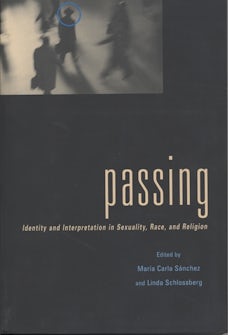Crossing Gender, Fantasizing BodiesPosted in Articles, Book/Video Reviews, Gay & Lesbian, History, Media Archive, Passing, United States on 2015-12-28 21:55Z by Steven |
Crossing Gender, Fantasizing Bodies
Transgender Studies Quarterly
Volume 2, Number 4, November 2015
pages 717-719
DOI: 10.1215/23289252-3151664
Michael Davidson, Professor Emeritus of American Literature; Distinguished Professor
University of California, San Diego
Fantasies of Identification: Disability, Gender, Race. Ellen Samuels. New York: New York University Press, 2014. 263 pp.
Ellen Samuels’ Fantasies of Identification is about attempts since the mid-nineteenth century to establish legal identity on some scientific, empirical basis as part of a national, biopolitical imperative. In this regard, the book contributes to the intersection of US literary history, disability, gender, queer, and critical race studies. Samuels chronicles a range of methods that were developed to regularize identity and naturalize the belief that identity could be read on the body. Examples include finger printing, the infamous one-drop rule for persons of African descent, current DNA testing for disabilities, blood quantum rules to establish Native American tribal identity, and myriad techniques of sex testing to verify legal gender within binary frameworks. Samuels observes that every attempt to ground identity in blood, genes, or appearance founders on the unstable nature of the very categories it hopes to stabilize: race, sex, gender, and ability. This instability is often produced by the imbricated relationship among such categories, and Samuels argues that disability is an always-present modality by and against which race, class, sex, and gender are read. Certifiable identity categories are, as her title indicates, “fantasies” produced by institutions wanting to secure populations in strict categories for the purposes of juridical, economic, and cultural control. But since these protocols are fantastic—a “thing we not only imagine but desire to be true” (6)—they are also subject to deformation, appropriation, and carnivalization by the…
Read or purchase the review here.


